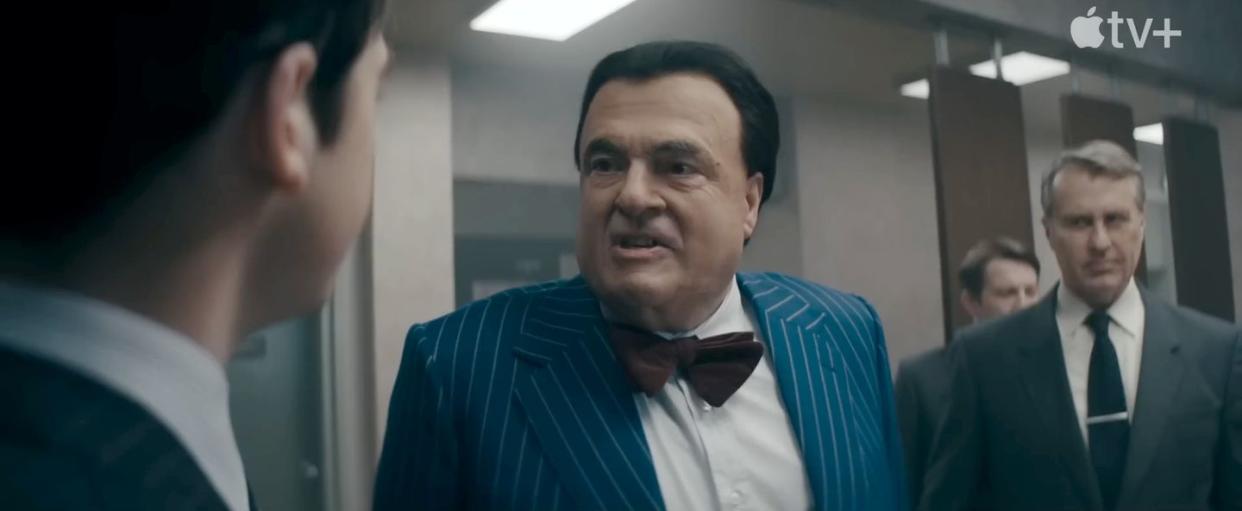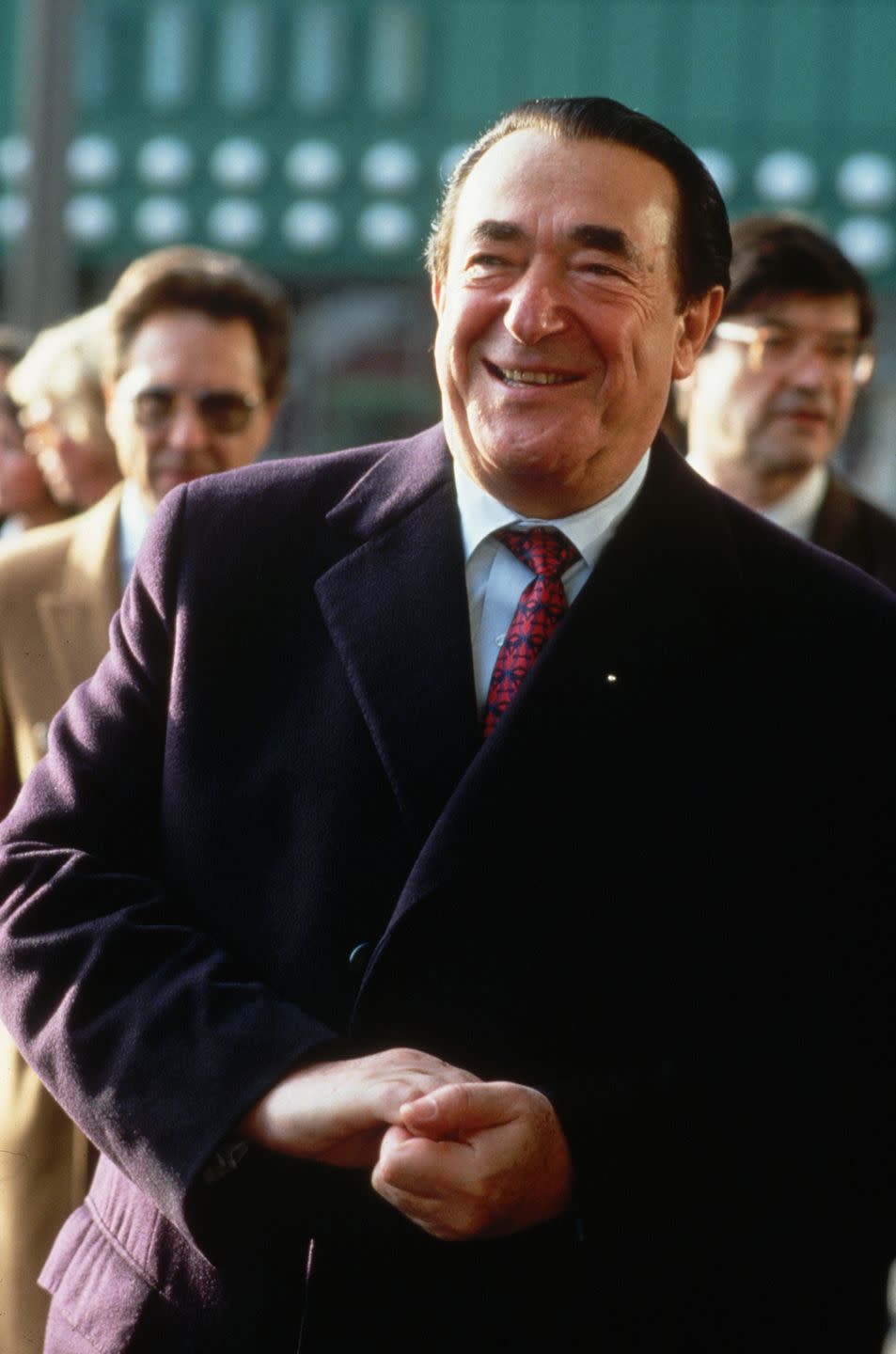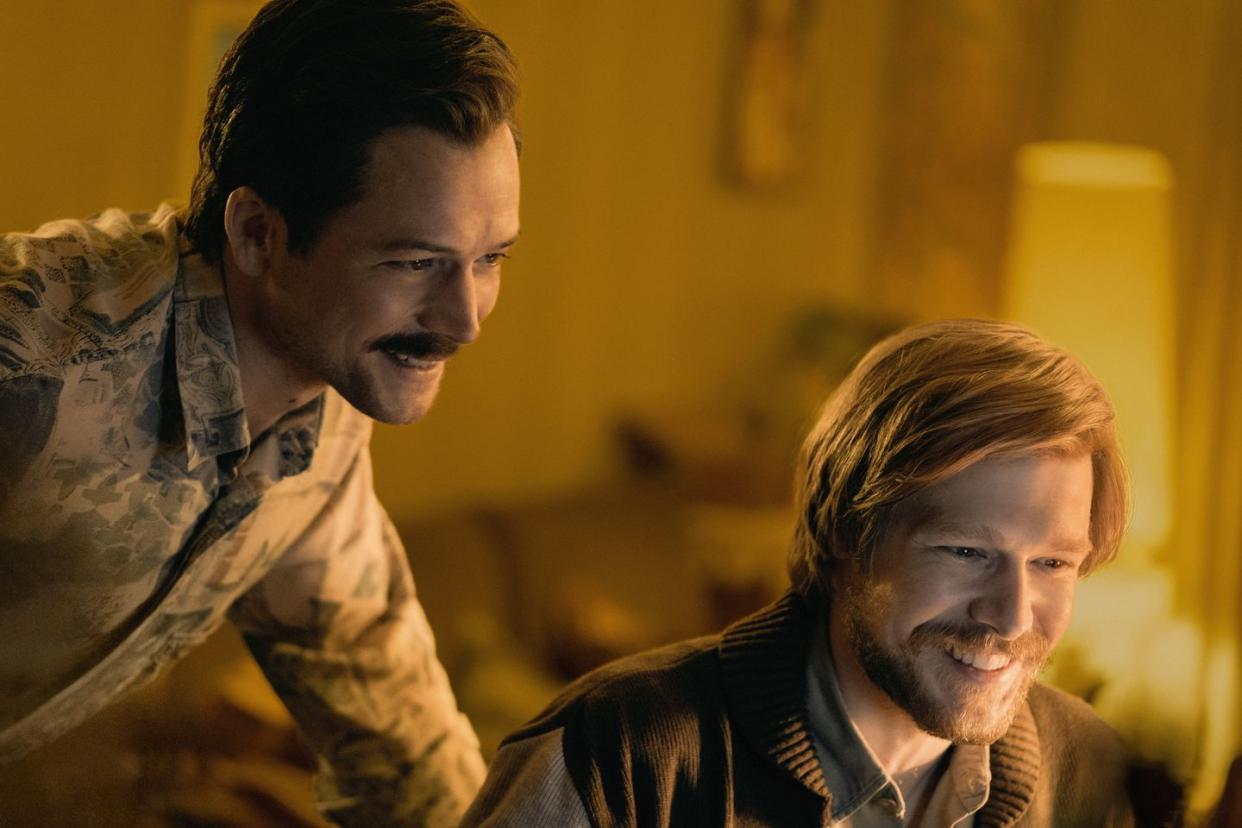Who was Robert Maxwell and what was his Tetris connection?
The new Apple Original movie Tetris tells the true story of how the addictive video game, invented in the USSR, made its way out of the Communist nation and became one of the most popular games in the world.
While the story focuses on businessman Henk Rogers (Taron Egerton), who tried to secure the worldwide rights for the game, and his friendship with Tetris inventor Alexey Pajitnov, there is a larger-than-life character lurking in the movie named Robert Maxwell (as played by Endeavour’s Roger Allam) who threatens to scupper their plans at every turn for his own benefit, like a particularly greedy pantomime villain.
So who was the real Robert Maxwell, and was he as awful as he is in Tetris?

Who was Robert Maxwell?
In Tetris, Robert Maxwell – along with his son Kevin – is the businessman desperately trying to win the rights to the videogame by fair means or foul.
Maxwell uses his association with Soviet leader Mikhail Gorbachev to try to gain an advantage over Henk Rogers, but his plans go awry because he does not have the millions he needs to secure the deal, despite – on paper at least – being a billionaire.
While the movie ends with a brief mention of what happened next to Maxwell – his media empire collapsed after he was discovered to have stolen from his companies’ pension funds – there is so much more to the story of the media mogul whose death in 1991 was as shocking as his flamboyant life.
Born in 1923 in the former Czechoslovakia, Maxwell – born Ján Ludvik Hyman Binyamin Hoch – fought with the British Army during World War II, winning a Military Cross for his service, and went on to work for the Foreign Office in Berlin.
He became a British citizen and changed his name to Ian Robert Maxwell, and married Elisabeth Betty Meynard in 1945. The couple had nine children, including Kevin, Ian, Karine (who died aged three), Michael (who died aged 22, having never regained consciousness following a car accident when he was 15) and Ghislaine, who is currently serving 20 years in prison in the US for child sex trafficking following her involvement with convicted sex offender Jeffrey Epstein.

Following the war, Maxwell was involved in both politics (he was a Labour MP for Buckingham between 1964 and 1970) and publishing, but he is best known as the owner of Mirror Group Newspapers, which he bought in 1984. The group included the Daily Mirror newspaper, Sunday Mirror, Sunday People, Scottish Sunday Mail and Scottish Daily Mail, starting a media war with his rival, Rupert Murdoch, who owned the News Of The World and The Sun.
Maxwell’s empire continued to grow, and by 1988 he also owned a record company (Nimbus), the Berlitz language schools, a half share of MTV in Europe, Macmillan publishers and the New York Daily News.
The 6ft 3in mogul lived a lavish life, based at Headington Hill Hall in Oxford, and would travel in his helicopter to Oxford United football club, which he owned for more than a decade. As Rob Walters noted in his book, Naughty Boys: Ten Rogues Of Oxford, football fans would chant “He’s fat, he’s round, he’s never on the ground. Captain Bob! Captain Bob!” when he flew in.
Maxwell was known for his temper – as shown in Tetris when he yells at son Kevin and everyone else who doesn’t do what he wants – with BBC News reporting that he punched one journalist in the back of the head (“Oh, mistaken identity,” he apparently said afterwards), and infamously fired a man for smoking in a lift, handing him a £250 payoff to leave then and there only to later discover it was a courier delivering a package and not even one of his employees.
However, Maxwell will be remembered for more than just his fiery temper, or even his wealth. For years, rumours swirled around the billionaire media mogul regarding his finances – he was known as the ‘Bouncing Czech’ – and in 1991 he had to sell two of his companies for £440 million to cover mounting debts.

On 4 November 1991, as reported by the Sunday Times, Robert Maxwell spoke to his son Kevin on the phone regarding a meeting they had with the Bank of England the next day. Robert was on his yacht, the Lady Ghislaine (named after his daughter), sailing near the Canary Islands, but it was important for him to return for the meeting as he had defaulted on a £50 million loan (that’s £50 million) and the bank understandably wanted their money back.
It was the last time Kevin spoke to his father. Robert Maxwell’s body was found the next day. As reported by Forbes, at some point in the night, he walked naked to the stern of the yacht, and then fell into the water. Three pathologists could not agree on cause of death – did he have a heart attack and fall in? Was he pushed? Or did he commit suicide?
Murder was even considered, as Maxwell had been rumoured to be a spy. The Independent reported that a self-proclaimed former Mossad officer had approached newspapers saying Maxwell was a long time agent for the Israeli intelligence service, and one theory – which has been widely disputed – is that he was going to go public until Israeli agents silenced him (presumably by pushing him into the water).
Aged 68, in poor health and overweight, it is more likely that Robert had a heart attack, fell and drowned. But even in death, he cast a mighty shadow.
Following his death, banks began calling in their loans and the Maxwell companies started to collapse. Amongst the chaos emerged the worst betrayal of all – Maxwell had stolen £440 million from his companies’ pension funds to save himself from bankruptcy. More than 30,000 current and former employees were told their pensions were missing.
The Maxwell companies filed for bankruptcy in 1992, and Robert’s son Kevin was himself declared bankrupt with debts of over £400 million.
Robert Maxwell – who was later described as ‘Crooked Robert Maxwell’ by the Daily Mirror, the paper he used to own (and where many of the staff lost their pension investments) – was certainly loved by very few, but some people have defended him, including Roy Greenslade, who worked as an editor for Maxwell.
He told BBC News: “What he did to the Mirror pensioners was terrible, and there’s no doubt that he ruled the office by fear.”
“But there was much more to him than that. Even if he treated you badly, you still recognised that. He could also be very funny, albeit unintentionally. He was a charismatic figure, a massive presence – literally, because of his huge frame.”
Tetris is released in select cinemas and on Apple TV+ from March 31.
You Might Also Like
